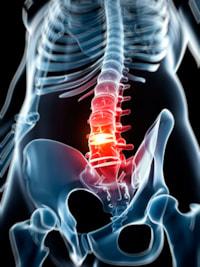Benefits of Transforaminal Lumbar Interbody Fusion (TLIF) Surgery
When conservative treatments fail to alleviate severe back pain caused by conditions like degenerative disc disease or spinal instability, surgical intervention may be necessary. Transforaminal Lumbar Interbody Fusion (TLIF) surgery is a procedure commonly performed to address these spinal conditions. Below we’ll explore what TLIF surgery entails, discuss the benefits it offers, and identify the individuals who can benefit the most from this surgical approach.
What Is TLIF Surgery?
Transforaminal Lumbar Interbody Fusion (TLIF) surgery is a spinal fusion procedure that focuses on stabilizing the lumbar spine, specifically the lower back. It involves accessing the spine from a posterior approach, typically through a small incision in the lower back. During the procedure, the damaged disc or bone material is removed, and bone grafts or implants are inserted to promote fusion between adjacent vertebrae. This fusion helps alleviate pain, restore stability, and improve the overall functionality of the spine.
Benefits of Transforaminal Lumbar Interbody Fusion (TLIF) Surgery:
a. Pain Relief: TLIF surgery is highly effective in reducing back and leg pain caused by conditions like herniated discs, spinal stenosis, or spondylolisthesis. By decompressing nerve roots and stabilizing the affected area, the surgery alleviates pressure on nerves, resulting in significant pain relief.
 b. Spinal Stability: One of the key benefits of TLIF surgery is the restoration of spinal stability. The fusion between vertebrae eliminates abnormal movement and instability in the affected segment of the spine. This stability helps prevent further degeneration and reduces the likelihood of future complications.
b. Spinal Stability: One of the key benefits of TLIF surgery is the restoration of spinal stability. The fusion between vertebrae eliminates abnormal movement and instability in the affected segment of the spine. This stability helps prevent further degeneration and reduces the likelihood of future complications.
c. Improved Functionality: Individuals who undergo TLIF surgery often experience an improvement in their ability to perform daily activities. By addressing the underlying cause of pain and instability, the surgery enables patients to regain mobility, flexibility, and overall functionality.
d. Reduced Dependency on Medication: Chronic back pain often requires long-term medication use, which can have side effects and limitations. TLIF surgery offers the potential for a significant reduction in pain, allowing patients to rely less on pain medication and potentially improving their overall quality of life.
e. Faster Recovery: While recovery times can vary, TLIF surgery generally offers a faster recovery compared to traditional open spinal surgeries. The minimally invasive nature of TLIF, with smaller incisions and reduced muscle trauma, contributes to a quicker return to daily activities and work.
Who Can Benefit Most From TLIF Surgery?
a. Spinal Instability: Individuals with spinal instability resulting from degenerative disc disease, spondylolisthesis, or spinal trauma can benefit greatly from TLIF surgery. The fusion procedure stabilizes the affected segment, reducing pain and preventing further degeneration.
 b. Disc Herniation: TLIF surgery is effective in addressing herniated discs that cause significant pain, nerve compression, and functional limitations. The procedure removes the damaged disc material and provides stability, relieving pressure on the affected nerves.
b. Disc Herniation: TLIF surgery is effective in addressing herniated discs that cause significant pain, nerve compression, and functional limitations. The procedure removes the damaged disc material and provides stability, relieving pressure on the affected nerves.
c. Spinal Stenosis: TLIF surgery can benefit individuals with spinal stenosis, a condition characterized by the narrowing of the spinal canal. By decompressing the nerves and stabilizing the spine, the surgery relieves pain and restores functionality.
d. Failed Conservative Treatments: Patients who have exhausted non-surgical treatment options, such as physical therapy, medication, and injections, without experiencing sufficient relief may be suitable candidates for TLIF surgery.
The NSSC Spine Clinic Can Help Determine The Best Approach For You
If you are experiencing chronic back pain, transforaminal lumbar interbody fusion (TLIF) surgery is a highly effective and minimally invasive procedure to consider. It is recommended for treating various spinal conditions that cause severe back pain and instability. That said, it is only one of your many options for reducing your pain and improving your quality of life.
To better understand treatment options, and what is best for your circumstances, please contact the NSSC Spine Clinic in Gastonia, NC today to schedule a consultation with Dr. Hunter. Dr. William Hunter is a board-certified neurosurgeon and spine specialist with over two decades of experience offering various treatments for back pain relief, including spine surgery, as well as minimally invasive techniques, and regenerative medical treatments.

